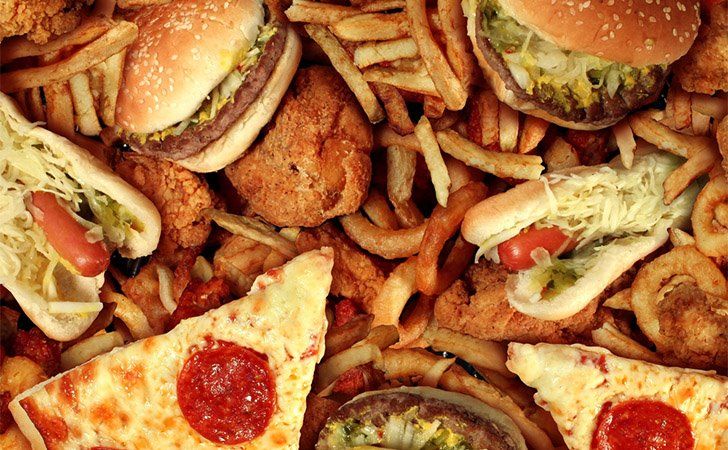Recent studies have raised health concerns regarding the prevalence of phthalates in American fast foods like chicken nuggets and hamburgers.
Phthalates are plasticizer chemicals that are added to many hundreds of products. One of their primary functions is to enhance the durability of polyvinyl chloride (PVC).
The following written content from Stephanie Brown

Traces of plastics have found their way into fast-food meals.
A new study found that phthalates, a group of industrial chemicals used to make plastics softer, are often present in foods like pizzas, hamburgers, and chicken nuggets.1
“Phthalates are found in a lot of packaging, processing, and handling equipment,” Lariah Edwards, PhD, a George Washington University researcher who co-wrote the study, told Verywell. She added that the chemicals can travel from plastic gloves or conveyor belts to food products.
Prior research has linked phthalate exposure to a wide range of health issues, including reproductive tract abnormalities,2 attention deficit hyperactivity disorder,3 behavioral problems, and more.
In 2017, the Consumer Product Safety Commission banned the use of phthalates in children’s toys and child-care articles. However, phthalates can still be used in food packaging and many personal care products.https://64c72a42b14f1e66a25304e380eed2e9.safeframe.googlesyndication.com/safeframe/1-0-38/html/container.html
Plastic manufacturers have started replacing phthalates with alternative plasticizers such as dioctyl terephthalate (DEHT), but the limited studies on DEHT have not proven that it’s safer. In the new study, DEHT was found in 70% of the food samples.1
“We wanted to measure these new replacement plasticizers because we know they are being used like the phthalates are,” Edwards said. “There’s just not a lot of available literature out there for us to really understand what they do to human health. And that’s concerning because we detect them in food that we are ingesting.”
Can You Avoid Phthalate Exposure?
Despite some regulations, phthalates can be found in cosmetics, plastic packaging, hair sprays, soaps and other products.4
“Phthalates are kind of an everywhere chemical,” Edwards said.
The new study showed that these chemicals were more common in meat-based items than other food products. Foods like cheese pizza and fries had the lowest concentration of plasticizers.
https://64c72a42b14f1e66a25304e380eed2e9.safeframe.googlesyndication.com/safeframe/1-0-38/html/container.html
“Limiting your fast food, in general, is the other way to minimize exposure, but that is not something that is accessible to everybody,” Edwards said. “Stronger policy would be the best way to ensure we’re not exposed to these chemicals.”
Lauri Wright, PhD, RDN, FADA, director of the Center for Nutrition and Food Security at the University of North Florida, noted that microwaving food in a plastic container can also increase the risk of phthalate exposure. Instead, she suggested reheating food on a ceramic dish.
What This Means For You
Check your cosmetics and personal care items to see if the labels say “phthalate-free.” The National Institute of Environmental Health Sciences has a list of phthalate compounds to look out for on labels. You can also contact your representatives to ask them to push for more policies that would ban phthalates and plasticizers in food products.
Although some manufacturers have replaced phthalates with alternative plasticizers, these new chemicals are not well-studied.
“Sometimes in our rush to get away from one harmful thing, we go with something else and it hasn’t been studied,” Wright said. “We need more research about the potential harm or safety of these replacement plastics.”
She pointed to a similar example in the food industry—replacing butter with margarine. “When we saw that butter contained saturated fat and could increase our risk for heart disease we rushed to make margarine out of vegetable oil,” Wright said.

While vegetable oils don’t have saturated fats, a byproduct of margarine is trans fast, which is as unhealthy, she added.
Instead of using alternative plasticizers, Wright said it’s safer to use plastic-free materials. However, these are often very expensive and policy changes are necessary to cut out phthalates and plasticizers from the food industry.
How May Policy Changes Reduce Phthalate and Plasticizer Exposure?
According to a report conducted by the Centers for Disease Control and Prevention (CDC), around 37% of adults consumed fast food on a given day. The report also suggested that a higher percentage of Black adults consumed fast food compared with other racial groups.5
“It could be as a result of racial residential segregation,” Edwards explained. “Other studies have shown there are higher densities of fast-food restaurants in predominantly areas of color.”
An overabundance of fast-food restaurants and a lack of access to nutritious foods are just some of the factors that contribute to health disparities in the United States.
“Black Americans are often more exposed to other chemicals, air pollution, things of that nature,” Edwards said, adding that the new study only piles on the concern that certain groups would be more vulnerable to phthalate exposure.
Even if consumers have the time and money to prepare meals at home or purchase “phthalate-free” personal care items, substantial policy changes and regulations will make the biggest difference.
“There has been a study that showed that sometimes phthalates are still detected in products even if it’s not written on the label, which is unfortunate. You feel like, as a consumer, what can you do?” Edwards said.
“Personal choice is important, do what you can,” she added. “But, really, I hope this work informs policy. Read more from Verywellhealth





